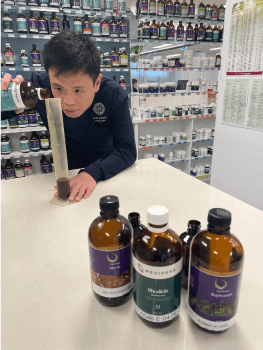Ben's Take on Naturopathy and Pharmaceutical Drugs
There are so many questions surrounding pharmaceutical drugs. Do we or don't we? Is there a way to just heal naturally, or can we do both?
Ben Lee, a naturopath from Australia, is here to answer this very question.
What has Ben's skin journey been?
Ben, having experienced TSW back in 2015, is aware of how tough it can be when figuring out what treatment is best for you. But, in his experience, a natural route through naturopathy helped him greatly.
While going through withdrawal, he had to put his life on pause, causing him to reevaluate his circumstance. And, after being a Public Policy Analyst for ten years, he completely quit that job and went into naturopathy. "I have never looked back since," he states. "I see many TSW and eczema patients weekly, and when I see them get better, there’s this joy in my heart that I can’t describe."
What is his favorite thing about naturopathy?

"Naturopathy gives me a huge toolbox of treatment modalities to help people," Ben shares.
There are many facets to naturopathy:
- Herbal medicine
- Nutritional medicine
- Food as medicine
- Functional testing
- Flower essences
- Homeopathy
But it doesn't just stop at a toolbox. It is a way of life. "From the nourishing foods we eat, the balanced lifestyle we live, the herbs we add into our foods, the affirmations we say to get through another tough TSW day, and the compassion we show ourself and others," Ben adds, delving into how his practice blends into daily life.
Why does Ben wish for self-compassion?
What he wishes most, however, is that his patients practice self-compassion.
"Be kind to yourself, give yourself time, draw healthy boundaries, drop perfectionism, eat healthily but don’t let an overly strict diet be an added source of stress," Ben prescribes. "Love, cry and know that you will be ok."
Can naturopathy work with pharmaceutical drugs?
Would you ever consider a pharmaceutical drug? Absolutely.
Ben dives into how the process works, dissecting how naturopathy is not a strict process where it can leave a patient feeling lost or alone, but an integrative way in aiding a patient to full health.
- Establish the Foundations of Health: Sunlight, clean water, laughter, anti-inflammatory foods, ensure living areas do not have mold
- Stimulate Self-healing: Red-light therapy, homeopathy, acupuncture
- Support and Restore Weakened Systems: Using foods and herbs to assist weakened organs
- Address Physical Alignment: Body work like osteopathy to ensure our nervous system is in good health
- Natural Symptom Relief: Natural anti-histamines like nettles, Quercetin, nigella
- Synthetic Symptom Relief: Pharmaceutical antihistamines and mast cell stabilizers, LDN
- Stronger Interventions: Immunosuppressants, Dupixent
"If we have done the first 5-6 levels, and the skin is still flaring, I believe there comes a point where quality of life is important," Ben insists. "We need to live our lives, we need to work, we need to earn an income, we have family to look after, and therefore using pharmaceutical drugs have their important and necessary place in the therapeutic order."
How can people focus on natural healing while taking drugs?
Can patients still effectively work on root cause issues while on certain drugs? Huge yes.
Ben is super empathetic towards patients who use pharmaceuticals and want them to know it doesn't mean they have to abandon their natural form of healing. He makes sure that the herbs he's using don't interact with the pharmaceutical treatment, establishes vitamins and minerals that may be depleted on the drug, and that he's focusing on supporting the hypothalamic-pituitary-adrenal axis (HPA axis) that is usually suppressed in those with topical steroid withdrawal.
"All in all, I never have the same prescription for any patients because everyone has such different constitutions and triggers," Ben declares.
It's very important for patients to feel they have options. That it isn't just one or the other. We can both work on our internal issues while also soothing our skin with new pharmaceuticals.
Join the conversation